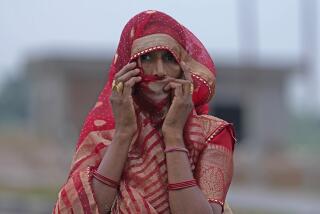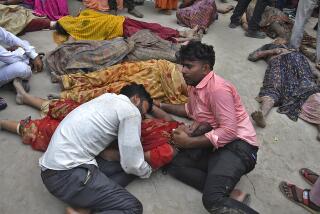Bombs Shake Indian Town; at Least 29 Die
- Share via
NEW DELHI — At least 29 people were killed and 100 wounded Friday when bomb blasts ripped through a western Indian town full of Muslim residents getting ready to celebrate a religious festival.
Authorities immediately slapped a curfew on parts of Malegaon for the night in an effort to head off any outbreak of the sectarian violence that the town has been prone to.
A top state official told reporters that the explosions were caused by bombs rigged to bicycles.
There was no immediate claim of responsibility for the explosions, which came two months after synchronized bombings killed about 200 people along a commuter rail network in the city of Mumbai, about 150 miles southwest of Malegaon. That attack was blamed on an Islamic militant group based in the disputed Himalayan region of Kashmir.
But Muslims were the apparent targets Friday afternoon as they prepared for the festival of Shab-e-Barat, or Night of Fortune, when they pray for the dead. Of the two, possibly three, blasts in Malegaon, one was near a mosque packed with worshipers and another in a busy market.
Anil Kumbre, a high-ranking police official in Malegaon, said late Friday that half of those wounded had suffered serious injuries and the confirmed death toll of 29 could rise.
Television coverage showed terrified residents stampeding from the site of the blasts, trampling over bloody bodies, some of which appeared to be those of children.
Home Minister Shivraj Patil said the incident seemed designed to “divide the various sections of the public.”
Army troops in the nearby town of Nasik were put on standby, a military official said, and major cities across the country went on heightened alert, stepping up security in public places such as shopping malls.
Religious strife has torn apart Malegaon before, most recently five years ago, when days of rioting between Hindus and Muslims led to a dozen deaths.
A struggling textile town in the western state of Maharashtra, Malegaon has a Muslim majority in its population of about 650,000.
There were unconfirmed reports that tension already had boiled over in the aftermath of Friday’s bombings, with angry crowds setting fire to police cars and throwing rocks at a hospital.
Fears of an eruption of violence also followed the July 11 Mumbai train bombings, but the city remained peaceful, despite a similar history of sectarian troubles that had worsened with the rise of Hindu nationalism across Maharashtra -- a political force that now seems to be waning somewhat.
“I don’t think this incident will affect the secular fabric of Maharashtra in any way,” said Rajani Patil, a former member of parliament from the state. “After all, it has already been proved during the recent Mumbai blasts, when the city limped back to normalcy within a few hours ... and citizens, cutting across all religions, helped each other.”
The attack was a stark reminder, however, of India’s stubborn terrorism problem. Dogged by a Maoist insurgency, Kashmiri militias and a host of other armed separatist groups, the government regards homegrown terrorism in the Indian subcontinent as one of the biggest threats to internal security.
This week, Prime Minister Manmohan Singh, meeting with top state officials from around the country, emphasized the need for better intelligence to combat terrorist attacks.
Last month, officials publicly warned of the possibility of such violence before the Independence Day celebrations. In an unusual move, the U.S. Embassy issued its own advisory to American citizens in India to be on their guard, especially in New Delhi, the capital, and Mumbai, formerly known as Bombay.
The U.S. ambassador, David C. Mulford, condemned Friday’s assault.
“There can be no justification for such heinous acts,” he said in a statement. “The United States stands with India in its fight against terrorism.”
The bombings in Malegaon were at least the fourth major attack in India, excluding the violence-racked Kashmir region -- within 10 1/2 months.
Last October, a series of blasts in New Delhi killed more than 50 people on the eve of a major Hindu holiday, and in March, about two dozen died in explosions in the holy Hindu city of Varanasi.
The Mumbai bombings have been the deadliest by far. That attack and the one in New Delhi have been blamed on Lashkar-e-Taiba, or Army of the Pure, one of many Kashmiri militant groups battling to make the mountainous region an independent state or unify it with neighboring Pakistan.
*
More to Read
Sign up for Essential California
The most important California stories and recommendations in your inbox every morning.
You may occasionally receive promotional content from the Los Angeles Times.













